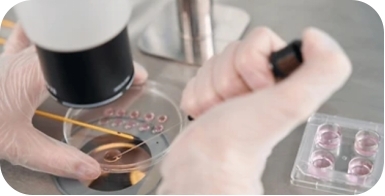- Home
- Services
- Advanced Materials R&D Services
- New Material Evaluation Based on Organoids
At the forefront of advanced materials research, organoid technology is rapidly revolutionizing traditional research models. Currently, scientists have successfully cultivated various organoids, such as the brain, intestine, and liver, providing brand-new research tools for advanced materials evaluation, personalized medicine, and regenerative medicine.

CD BioSustainable-Advanced Materials is an innovative company specializing in advanced materials R&D and evaluation, committed to providing clients with comprehensive new material evaluation services based on organoid technology. Relying on an advanced organoid modeling and identification platform, we are able to highly simulate the microenvironment of human tissue and provide accurate evaluations of the safety, biocompatibility, and functionality of new materials.
Organoids are self-derived, multicellular, three-dimensional tissues that form from self-cell cultures, serving as superior substitutes for animal models. Unlike organoids, two-dimensional cell models are bound to shorter lifespans as well as face a multitude of ethical concerns related to animal testing. In addition to these benefits, organoids are far closer to real organs as they contain distinct features of specific organs. Since organoids contain a considerable variety of diverse cells, they replicate the structure and complexity of true organs with great accuracy.
 Fig. 1 Schematic diagram of organoid formation. (Unagolla JM, Jayasuriya AC, 2022)
Fig. 1 Schematic diagram of organoid formation. (Unagolla JM, Jayasuriya AC, 2022)
| Organoid Models | Material Types | Testing Indicators |
| Intestinal organoids | Drug carriers | Mucosal permeability, intestinal barrier integrity (TEER) |
| Nanoparticles | Cell uptake efficiency, tight junction protein expression | |
| Food additives | Inflammatory factors (IL-8), apoptosis markers | |
| Liver organoids | Biodegradable scaffolds | Albumin secretion, urea cycle function |
| Industrial chemicals | CYP450 enzyme activity, degree of fatty degeneration | |
| Drug sustained-release materials | Metabolite accumulation, bile duct network integrity | |
| Skin organoids | Medical dressings | Stratum corneum regeneration rate, collagen deposition |
| Cosmetic ingredients | Melanin production, TRPV1 receptor activation | |
| Transdermal administration systems | Permeability coefficient, Langerhans cell activation | |
| Lung organoids | Air purification materials | Cilia beating frequency, mucus secretion volume |
| Inhaled nanoparticles | Alveolar macrophage phagocytic activity | |
| Heart organoids | Conductive biomaterials | Calcium transient frequency, beating synchrony |
| Drug-coated stents | Risk of QT interval prolongation | |
| Environmental remediation materials | Myocardial cell apoptosis rate |
We offer precise and comprehensive multi-lineage organoid model construction and organoid culture, all while recapitulating human microenvironments, facilitating scientific research and material innovation.

Using organoid models, we provide full scientific evaluation services to assist clients in understanding more about the safety, biocompatibility, and functionality of new materials. Our services include the following:




Medical Device and Biomaterial

Cosmetics and Skincare

Environment and Chemistry
Using our innovative organoid technology platform, CD BioSustainable-Advanced Materials assists clients in accelerating R&D cycles, cutting down testing expenses, and offering dependable data during the new material development phase, which simulates the human body's response more precisely. Should you have any questions, do not hesitate to contact us to learn more about our offerings.
Reference
For Research or Industrial Raw Materials, Not For Personal Medical Use!
|
There is no product in your cart. |